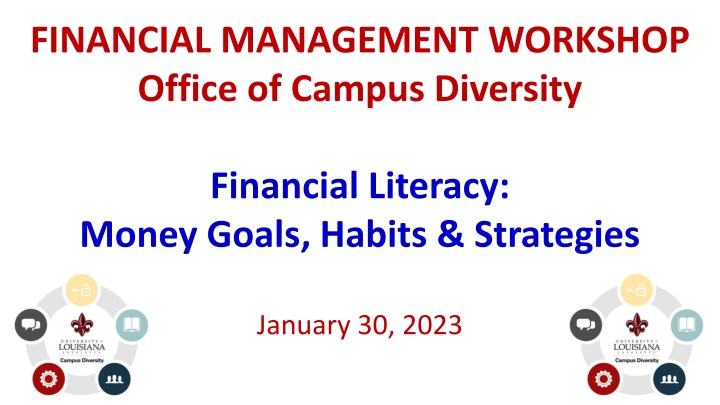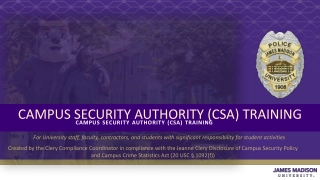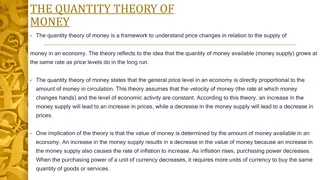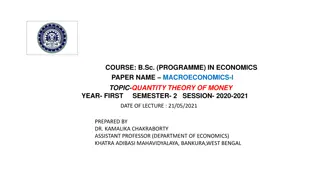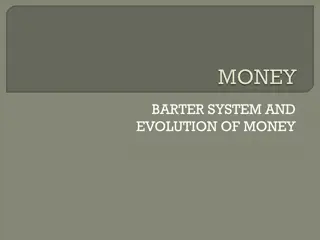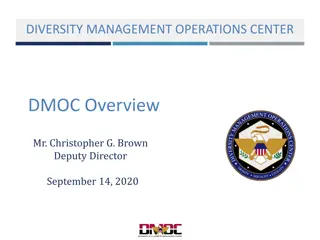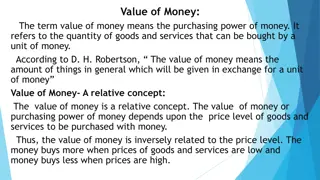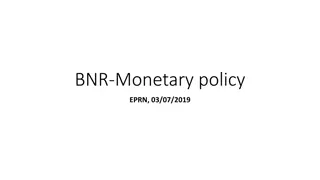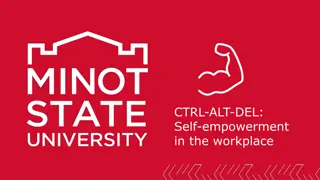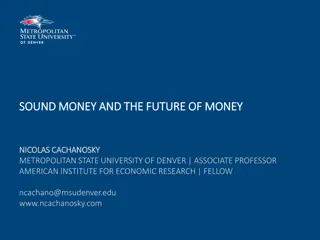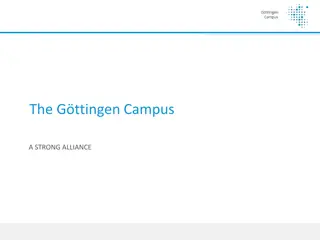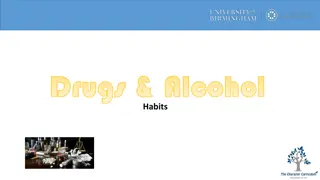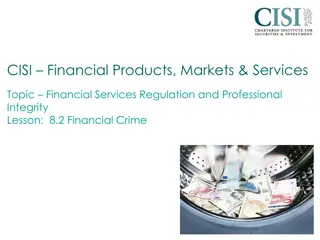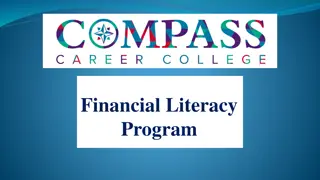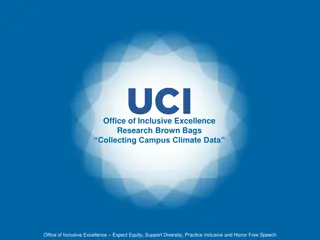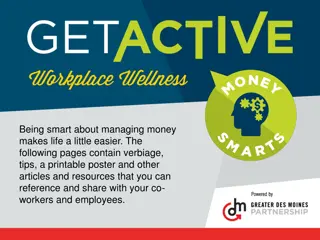Financial Management Workshop for Campus Diversity: Money Goals, Habits & Strategies
Explore the keys to financial wellness at the Office of Campus Diversity's Financial Management Workshop focusing on setting money goals, developing healthy habits, and effective strategies for short and long-term financial success. Learn from experts like Professor Brian Bolton and elevate your understanding of personal finance to achieve happiness and fulfill your financial needs. Make informed decisions, plan ahead, and take action towards a secure financial future.
Download Presentation

Please find below an Image/Link to download the presentation.
The content on the website is provided AS IS for your information and personal use only. It may not be sold, licensed, or shared on other websites without obtaining consent from the author.If you encounter any issues during the download, it is possible that the publisher has removed the file from their server.
You are allowed to download the files provided on this website for personal or commercial use, subject to the condition that they are used lawfully. All files are the property of their respective owners.
The content on the website is provided AS IS for your information and personal use only. It may not be sold, licensed, or shared on other websites without obtaining consent from the author.
E N D
Presentation Transcript
FINANCIAL MANAGEMENT WORKSHOP Office of Campus Diversity Financial Literacy: Money Goals, Habits & Strategies January 30, 2023
Brian Bolton Professor of Finance brian.bolton@louisiana.edu http://business.louisiana.edu/financeispersonal
Happiness Short-Term Goals Long-Term Goals Family Needs Financial Needs Office of Campus Diversity Financial Management Workshop Financial Literacy: Money Goals, Habits & Strategies
Classes & Thesis Friends & Family Student Success Health: Mental & Physical Career Planning External Issues Financial Wellness Office of Campus Diversity Financial Management Workshop Financial Literacy: Money Goals, Habits & Strategies
Professional & Financial Success Education & Training Friends & Family Health: Mental & Physical Career Planning External Issues Financial Wellness Office of Campus Diversity Financial Management Workshop Financial Literacy: Money Goals, Habits & Strategies
Financial Wellness A goal without a plan is just a dream. Wealth is largely the result of habit. The most difficult thing is the decision to act; the rest is mere tenacity. It takes as much energy to plan as it does to wish. You cannot escape the responsibility of tomorrow by avoiding it today. Office of Campus Diversity Financial Management Workshop Financial Literacy: Money Goals, Habits & Strategies
This is exactly how most of us think about other priorities in our lives: family, career, education. A goal without a plan is just a dream. Wealth is largely the result of habit. Let s try to have the same thinking for our financial lives. The most difficult thing is the decision to act; the rest is mere tenacity. It takes as much energy to plan as it does to wish. You cannot escape the responsibility of tomorrow by avoiding it today. Office of Campus Diversity Financial Management Workshop Financial Literacy: Money Goals, Habits & Strategies
Investments Expenses Office of Campus Diversity Financial Management Workshop Financial Literacy: Money Goals, Habits & Strategies
Indulge Impulse Office of Campus Diversity Financial Management Workshop Financial Literacy: Money Goals, Habits & Strategies
Values & Goals Ego & Flexing Office of Campus Diversity Financial Management Workshop Financial Literacy: Money Goals, Habits & Strategies
What Are Your Values, Dreams & Goals? Education Career Family What Is Your Current Situation? Education Career Family Financial Office of Campus Diversity Financial Management Workshop Financial Literacy: Money Goals, Habits & Strategies
Create a Personal Financial Plan for You: Debt Taxes Investing Budgeting Management Education Insurance Retirement Estate Planning Business Planning Philanthropy Family Office of Campus Diversity Financial Management Workshop Financial Literacy: Money Goals, Habits & Strategies
A Few Opening Morals Personal Finance is personal. It s about you and not about anyone else. You have to make it about you and your goals. Office of Campus Diversity Financial Management Workshop Financial Literacy: Money Goals, Habits & Strategies
A Few Opening Morals There is no judgment in personal finance. There is no ego in personal finance. There is no shame in personal finance. It s about you and not about anyone else. Office of Campus Diversity Financial Management Workshop Financial Literacy: Money Goals, Habits & Strategies
A Few Opening Morals Because personal finance is personal, it is virtually impossible for me to give you any specific advice. However, there is one word of advice that applies to 99% of people working on their finances: SAVE Office of Campus Diversity Financial Management Workshop Financial Literacy: Money Goals, Habits & Strategies
A Few Opening Morals SAVINGS INVESTING OWNERSHIP WEALTH Office of Campus Diversity Financial Management Workshop Financial Literacy: Money Goals, Habits & Strategies
Owning Your Financial Future What Are Your Values, Dreams & Goals? Education Career Family What Is Your Current Situation? Education Career Financial Family Create a Personal Financial Plan for You: Debt Budgeting Investing Taxes Management Insurance Retirement Education Business Planning Estate Planning Office of Campus Diversity Financial Management Workshop Family Philanthropy Financial Literacy: Money Goals, Habits & Strategies
Long-Term Investment Planning FINANCIAL STRATEGIES INVESTMENT STRATEGIES Identify Your Risk Tolerance Identify Your Time Horizons Select Investments Monitor & Modify Investments Office of Campus Diversity Financial Management Workshop Financial Literacy: Money Goals, Habits & Strategies
Long-Term Investment Planning FINANCIAL GOALS INVESTMENT STRATEGIES EDUCATION GOALS EDUCATION STRATEGIES Identify Your Risk Tolerance & Priorities Identify Your Time Horizons Identify Your Risk Tolerance & Priorities Identify Your Time Horizons Select Your Field, Program, Specialization, Thesis Select Investments Monitor & Modify Investments Monitor & Modify Your Progress & Plan Office of Campus Diversity Financial Management Workshop Financial Literacy: Money Goals, Habits & Strategies
Isnt this a lot like what you do with your education planning? Office of Campus Diversity Financial Management Workshop Financial Literacy: Money Goals, Habits & Strategies
Opening Quiz Question #1 The U.S. stock markets had a terrible 2022. But that was just 1 year. If you had invested $1,000 in the S&P 500 at the beginning of 2021 (2 years years ago), how much would that $1,000 be worth today? A. $557 B. $755 C. $1,058 D. $3,149 Office of Campus Diversity Financial Management Workshop Financial Literacy: Money Goals, Habits & Strategies
Opening Quiz Question #1 The U.S. stock markets had a terrible 2022. But that was just 1 year. If you had invested $1,000 in the S&P 500 at the beginning of 2021 (2 years years ago), how much would that $1,000 be worth today? A. $557 B. $755 C. $1,058 D. $3,149 Office of Campus Diversity Financial Management Workshop Financial Literacy: Money Goals, Habits & Strategies
Opening Quiz Question #1a The U.S. stock markets had a terrible 2022. But that was just 1 year. If you had invested $1,000 in the S&P 500 at the beginning of 2013 (10 years ago), how much would that $1,000 be worth today? A. $557 B. $755 C. $1,058 D. $3,149 Office of Campus Diversity Financial Management Workshop Financial Literacy: Money Goals, Habits & Strategies
Opening Quiz Question #1a The U.S. stock markets had a terrible 2022. But that was just 1 year. If you had invested $1,000 in the S&P 500 at the beginning of 2013 (10 years ago), how much would that $1,000 be worth today? A. $557 B. $755 C. $1,058 D. $3,149 That s an average annual return of 12% of over 10 years. Office of Campus Diversity Financial Management Workshop Financial Literacy: Money Goals, Habits & Strategies
Opening Quiz Question #2 If you borrow $10,000 for a student loan, at an interest rate of 5%, and you repay the loan with monthly payments over 10 years, how much total interest will you pay over the life of the loan? A. $500 B. $1,723 C. $2,723 D. $12,393 Office of Campus Diversity Financial Management Workshop Financial Literacy: Money Goals, Habits & Strategies
Opening Quiz Question #2 If you borrow $10,000 for a student loan, at an interest rate of 5%, and you repay the loan with monthly payments over 10 years, how much total interest will you pay over the life of the loan? A. $500 B. $1,723 C. $2,723 D. $12,393 Office of Campus Diversity Financial Management Workshop Financial Literacy: Money Goals, Habits & Strategies
Opening Quiz Question #2a If you borrow $10,000 for a fun vacation using your credit card, at an interest rate of 18.99%, and you repay the loan with monthly payments over 10 years, how much total interest will you pay over the life of the loan? A. $500 B. $1,723 C. $2,723 D. $12,393 Office of Campus Diversity Financial Management Workshop Financial Literacy: Money Goals, Habits & Strategies
Opening Quiz Question #2a If you borrow $10,000 for a fun vacation using your credit card, at an interest rate of 18.99%, and you repay the loan with monthly payments over 10 years, how much total interest will you pay over the life of the loan? A. $500 B. $1,723 C. $2,723 D. $12,393 Office of Campus Diversity Financial Management Workshop Financial Literacy: Money Goals, Habits & Strategies
Opening Quiz Question #3 If you invest $100 a month every month from ages 25 to 35, earning an 8% annual return, how much will you have accumulated when you retire at 65? If you invest $100 a month every month from ages 35 to 65, earning an 8% annual return, how much will you have accumulated when you retire at 65? A. $149,036 C. $149,036 B. $184,092 D. $184,092 Office of Campus Diversity Financial Management Workshop Financial Literacy: Money Goals, Habits & Strategies
Opening Quiz Question #3 If you invest $100 a month every month from ages 25 to 35, earning an 8% annual return, how much will you have accumulated when you retire at 65? If you invest $100 a month every month from ages 35 to 65, earning an 8% annual return, how much will you have accumulated when you retire at 65? A. $149,036 C. $149,036 B. $184,092 D. $184,092 In both cases, this math assumes you make your 1st investment in the first month of your 26th or 36th year and keep all money invested until the end of your 65th year. Office of Campus Diversity Financial Management Workshop Financial Literacy: Money Goals, Habits & Strategies
Opening Quiz The Morals 1. Nothing is free in finance. You have to sacrifice something to receive something good. Every benefit has a cost. Be mindful of short-term vs. long-term tradeoffs. Is a short-term indulgence worth a long-term sacrifice? Top Ramen costs $0.25 per meal. Gourmet ramen can cost $20 per meal. (Or $50+ for truffle ramen.) Interest is your friend if you are receiving it. Interest is your enemy if you are paying it. Save and invest as early as you can. Small savings today can create enormous opportunities in the future. Debt can change your life both for the better and for the worse. Don t let debt destroy your life and determine your future. 2. 3. 4. 5. Office of Campus Diversity Financial Management Workshop Financial Literacy: Money Goals, Habits & Strategies
Free Moneyfor you or for your bank? $250,000 $200,000 $150,000 $100,000 $50,000 $- Interest Principal Borrowing $100,000 At 15% Interest Repaying over 20 years. Office of Campus Diversity Financial Management Workshop You Borrow $100,000 You Repay $316,030 Financial Literacy: Money Goals, Habits & Strategies
Free Moneyfor you or for your bank? $250,000 $45,000 $200,000 $40,000 $150,000 $35,000 $100,000 $30,000 $50,000 $25,000 $- $20,000 Interest Principal $15,000 Borrowing $100,000 At 15% Interest Repaying over 20 years. $10,000 $5,000 $- You Borrow $100,000 You Repay $316,030 Interest Principal Investing $50 a month At 10% interest For 20 years You Invest $12,000 You Have $38,285 Office of Campus Diversity Financial Management Workshop Financial Literacy: Money Goals, Habits & Strategies
Opening Quiz The Morals 1. Nothing is free in finance. You have to sacrifice something to receive something good. Every benefit has a cost. Be mindful of short-term vs. long-term tradeoffs. Is a short-term indulgence worth a long-term sacrifice? Top Ramen costs $0.25 per meal. Gourmet ramen can cost $20 per meal. (Or $50+ for truffle ramen.) Interest is your friend if you are receiving it. Interest is your enemy if you are paying it. Save and invest as early as you can. Small savings today can create enormous opportunities in the future. Debt can change your life both for the better and for the worse. Don t let debt destroy your life and determine your future. Be thoughtful, be strategic, be patient and have a plan. 2. 3. 4. 5. 6. Office of Campus Diversity Financial Management Workshop Financial Literacy: Money Goals, Habits & Strategies
Brians Economic Predictions for 2023 Inflation is decreasing but it is still very high. Inflation was at 9.1% in June 2022; it is now at 6.5%. My best case estimate is for it to be at 3-4% in December. It might be 8-9%. Office of Campus Diversity Financial Management Workshop Financial Literacy: Money Goals, Habits & Strategies
Brians Economic Predictions for 2023 Inflation was at 9.1% in June 2022; it is now at 6.5%. My best case estimate is for it to be at 3-4% in December. It might be 8-9%. Interest rates are going up. This will affect future borrowing costs. Interest rates on savings accounts are the last to go up when rates increase. This should slow down inflation, but it will take a while. Office of Campus Diversity Financial Management Workshop Financial Literacy: Money Goals, Habits & Strategies
Brians Economic Predictions for 2023 Inflation was at 9.1% in June 2022; it is now at 6.5%. My best case estimate is for it to be at 3-4% in December. It might be 8-9%. Interest rates are going up. This will affect future borrowing costs. Interest rates on savings accounts are the last to go up when rates increase. This should slow down inflation, but it will take a while. The Russian invasion of Ukraine will continue to cause economic turbulence through the year. Turbulence = Uncertainty, disruption to supply chains, shocks out of nowhere. Office of Campus Diversity Financial Management Workshop Financial Literacy: Money Goals, Habits & Strategies
Brians Economic Predictions for 2023 Inflation was at 9.1% in June 2022; it is now at 6.5%. My best case estimate is for it to be at 3-4% in December. It might be 8-9%. Interest rates are going up. This will affect future borrowing costs. Interest rates on savings accounts are the last to go up when rates increase. This should slow down inflation, but it will take a while. The Russian invasion of Ukraine will continue to cause economic turbulence through the year. Turbulence = Uncertainty, disruption to supply chains, shocks out of nowhere. We are still in a Covid-19 world. It is not completely behind us. Some of China is locked down, education uncertainty, travel uncertainty. Office of Campus Diversity Financial Management Workshop Financial Literacy: Money Goals, Habits & Strategies
Brians Economic Predictions for 2023 Inflation was at 9.1% in June 2022; it is now at 6.5%. My best case estimate is for it to be at 3-4% in December. It might be 8-9%. Interest rates are going up. This will affect future borrowing costs. Interest rates on savings accounts are the last to go up when rates increase. This should slow down inflation, but it will take a while. The Russian invasion of Ukraine will continue to cause economic turbulence through the year. Turbulence = Uncertainty, disruption to supply chains, shocks out of nowhere. We are still in a Covid-19 world. It is not completely behind us. Some of China is locked down, education uncertainty, travel uncertainty. The job market has been strong but may struggle during early-2023. Salaries for college graduates are at all-time highs. I expect this to continue. But, there will be unexpected shocks as companies try to figure out how to do business in 2023. Office of Campus Diversity Financial Management Workshop Financial Literacy: Money Goals, Habits & Strategies
Brians Economic Predictions for 2023 Inflation was at 9.1% in June 2022; it is now at 6.5%. My best case estimate is for it to be at 3-4% in December. It might be 8-9%. Interest rates have gone up. This will affect future borrowing costs. Interest rates on savings accounts are the last to go up when rates increase. This should slow down inflation, but it will take a while. The Russian invasion of Ukraine will continue to cause economic turbulence through the year. Turbulence = Uncertainty, disruption to supply chains, shocks out of nowhere. We are still in a Covid-19 world. It is not completely behind us. Much of China is locked down, education uncertainty, travel uncertainty. The job market has been strong but may struggle during early-2023. Salaries for college graduates are at all-time highs. I expect this to continue. But, there will be unexpected shocks as companies try to figure out how to do business in 2023. PLAN AHEAD Office of Campus Diversity Financial Management Workshop Financial Literacy: Money Goals, Habits & Strategies
Brians Economic Predictions for 2023 Inflation was at 9.1% in June 2022; it is now at 6.5%. My best case estimate is for it to be at 3-4% in December. It might be 8-9%. Interest rates have gone up. This will affect future borrowing costs. Interest rates on savings accounts are the last to go up when rates increase. This should slow down inflation, but it will take a while. The Russian invasion of Ukraine will continue to cause economic turbulence through the year. Turbulence = Uncertainty, disruption to supply chains, shocks out of nowhere. We are still in a Covid-19 world. It is not completely behind us. Much of China is locked down, education uncertainty, travel uncertainty. The job market has been strong but may struggle during early-2023. Salaries for college graduates are at all-time highs. I expect this to continue. But, there will be unexpected shocks as companies try to figure out how to do business in 2023. Take steps today to make future shocks or uncertainty less painful for you even if those steps are just with your attitude and perspective on financial planning. Office of Campus Diversity Financial Management Workshop Financial Literacy: Money Goals, Habits & Strategies
15 Simple Challenges You Can Take to Help You Control Your Financial Future (and maybe be better prepared for future financial turbulence) Office of Campus Diversity Financial Management Workshop Financial Literacy: Money Goals, Habits & Strategies
15 Simple Challenges for This Year CHALLENGE #1 For 1 or 2 months this year, track every penny you spend. Every single penny. And do this old school with a pen and paper (or not-so-old school with Excel). Do not use financial software like Quicken or Quickbooks and do not rely on your bank debit or credit card statement. By doing it manually, you will internalize and analyze each penny spent better. Describe the expense, note the amount and make any comments that are relevant. The point is for you to become aware of what you re doing and then to analyze it. Are you spending more or less than you want? Do you notice any trends. Do you notice any emotion-driven purchases? And now that you ve seen this, can you do anything about it can you change your behavior. Office of Campus Diversity Financial Management Workshop Financial Literacy: Money Goals, Habits & Strategies
15 Simple Challenges for This Year CHALLENGE #2 Stop spending money after a certain time at night. I m an early bird, so I don t spend any money after 8pm. Occasionally, I have to make an exception if I m at dinner with friends, but having this mentality prevents me from making frivolous purchases that do not bring me much joy. Maybe a daily deadline won t work for you; what about picking 1 day a week where you won t buy anything? Pick a goal that challenges you a bit, that brings you some benefit, but doesn t force you to sacrifice your lifestyle too much. Office of Campus Diversity Financial Management Workshop Financial Literacy: Money Goals, Habits & Strategies
15 Simple Challenges for This Year CHALLENGE #3 For any purchases over a certain amount, wait 24 hours before buying. For me, it s $100. If I want to buy anything that costs over $100, I wait at least 24 hours. If I see some shoes online or a flight I want to buy, I wait, think about it and then decide if I need it. Many times I decide I do not. Other times I m even more excited about it and then I do it. Forcing myself to wait makes me be more intentional with my purchases, which is a big part of me taking ownership of my money. Note, the one exception to this is groceries: I need food and I will eat the food, so I do not wait to buy groceries I need. Office of Campus Diversity Financial Management Workshop Financial Literacy: Money Goals, Habits & Strategies
15 Simple Challenges for This Year CHALLENGE #4 As soon as you get each paycheck, or on the 1st day of each month, explicitly save $25. Maybe that means moving $25 from your checking or debit account to a savings account. And then do not touch that money. The goal is to get in the habit of paying yourself first (or paying your future self first). And a side benefit is that you will have separate financial accounts, each with separate financial goals. Office of Campus Diversity Financial Management Workshop Financial Literacy: Money Goals, Habits & Strategies
15 Simple Challenges for This Year CHALLENGE #5 Make saving a game. After saving $25 on the first day of the month, set a goal to save even more during the rest of the month. Maybe you set the goal of saving another $50. If you manage to save $150 instead of $50, celebrate your success by taking the additional $100 and using some of it to treat yourself. Maybe it s a spa day or a nice dinner and then take what s leftover from this treat and put it towards savings. Office of Campus Diversity Financial Management Workshop Financial Literacy: Money Goals, Habits & Strategies
15 Simple Challenges for This Year CHALLENGE #5 - Alternative Make saving a game. Anytime you treat yourself to a purchase over a certain amount, set aside of the amount amount of the purchase to give to charity. For me, it s $200. If I buy anything over $200 except food or rent I immediately set aside of the amount to give to charity. I do not donate the money immediately, but I may pool it over several months to be able to give a bigger donation. Office of Campus Diversity Financial Management Workshop Financial Literacy: Money Goals, Habits & Strategies
15 Simple Challenges for This Year CHALLENGE #6 Check your credit score. And study your credit report. You can get a credit report for free from TransUnion, Equifax or Experian. Make sure what s on the credit report belongs to you. Challenge anything that is wrong. And make a plan to improve your credit score by cleaning up your credit report or establishing a payment history that will work to your advantage over time. Office of Campus Diversity Financial Management Workshop Financial Literacy: Money Goals, Habits & Strategies
15 Simple Challenges for This Year CHALLENGE #6 - Bonus Check your credit score. And study your credit report. For the most part, the only way to improve your credit score is slowly over time. However, there is one hack that might provide a one-time bump to your credit score: request a higher credit limit for all your credit cards. But, of course, do not use this higher limit. Office of Campus Diversity Financial Management Workshop Financial Literacy: Money Goals, Habits & Strategies
